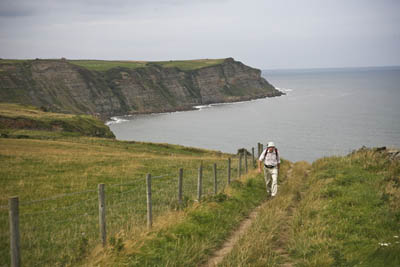
Creating an English coastal path 'will boost the economy'
Opening England’s coast to walkers will boost the country’s flagging economy by £128m, campaigners will tell Parliament today.
A report commissioned by the Ramblers found that more than 11,300 jobs could be created if the proposed path along the whole length of the country’s coast becomes a reality. The House of Lords is debating the Marine and Coastal Access Bill, which includes the provision for a coastal corridor for walkers.
Tom Franklin, chief executive of the Ramblers – formerly the Ramblers’ Association – said: “For coastal economies, the continuous coastal path around Britain is paved with gold.”
“Our vision is for a coastal trail that brings economic and ecological prosperity to coastal areas – currently suffering badly in the recession. Investment will improve walking opportunities, wildlife protection on the coast, and will rejuvenate struggling coastal businesses.”
Government agency Natural England found you can only walk along the coast for an hour on average before you are confronted by an obstruction that would force you to turn back or head inland. It also said about half of the English coastline will need improving to enable a continuous coastal trail.
Liberal Democrat Peer Lord Greaves said: “Coastal walking brings in millions to the rural economy.
“Just look at the South West Coastal Path, which generates £307 million for the regional economy annually. If the proposed English coastal path brings similar benefits around the English coast, it will bring significant benefits to local businesses and the wider rural economy.”
The Outdoor Industries Association, the trade body representing manufacturers and retailers, found that almost half the British population said it was more likely to take a British outdoor break because of the worsening economic climate.
The weak pound and economic uncertainty have convinced more Britons to stay at home for an activity holiday. Of those questioned in the survey conducted earlier this month, the biggest number, 51 per cent, said walking was most popular, with camping at 21 per cent and road cycling and mountain biking also favoured activities. 11 per cent took part in longer distance hiking.
Frank Bennett, chairman of the OIA, said: “Everyone is acutely aware that the UK is experiencing a sharp economic downturn, which is having a major impact on the habits of the general public.
“This research provides businesses that are operating in the outdoors sector with some good news: namely, that more of the general public are planning to stay in this country and explore the outdoors. This means that despite the wider situation, there are still significant business opportunities for retailers, brands, holiday providers and other organisations.”
The Piglit
28 January 2009Isn't promoting the idea of long overdue access on the basis of a (debatable) assertion that it will make money for someone is IMHO a dangerous precident and a sign of the times!